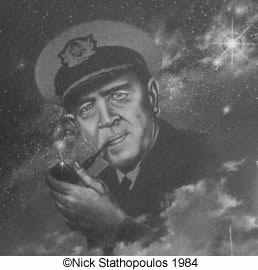
A
(Arthur) Bertram Chandler was born in Aldershot, England in 1912, Chandler sailed
the world in every-thing from tramp steamers to troop transports before emigrating
to Australia in 1956. Here he commanded merchant vessels under the Australian and
New Zealand Flags up to his retirement in 1974.
Up until his death in 1984 he published over 40 science fiction novels and over
200 works of short fiction writing as A Bertram Chandler, George Whitley or Andrew
Dunstan. Many of the novels had a nautical theme, with the plot moved from the seas
of earth to the ships of space in the future. Many of the stories revolved around
the character of John Grimes some times referred to as “Hornblower of Space”. While
most stories are set in the future, they also have a distinctly “Australian” theme
with places and stories relating back to Australia today.
Chandler was the last master of the aircraft carrier Melbourne. Law required it
to have a master aboard for the months while it was laid up and waiting to be towed
off to Asia to be broken up for scrap, so in a sense he really was briefly the master
of the Australian navy's former flagship. Apparently he had his typewriter aboard,
and worked on his novels!
Chandler received four Australian SF "Ditmar" Achievement Awards for his
novels. Nearly all of his novels were published in the USA. Two of his short stories
'The Cage' and 'Giant Killer’ are regarded as some of the best SF stories
written in the 1950's. He was also very popular in Japan winning the prestigious
SEIUN SHO, the premier Science Fiction award. The Japanese editions have some of
the best covers of any of the published editions.
Baen Books
Baen Books have released four John Grimes anthologies
To the Galactic Rim: The John Grimes Saga
,
First Command: The John Grimes Saga II
,
Galactic Courier: The John Grimes Saga III
and
Ride the Star Winds: The John Grimes Saga IV
. These are available as both eBooks and Trade Paperbacks
Prologue Books
Prologue Books have reprinted 8 Novels as eBooks, including the hard to find Glory Planet, now available for the second time since the initial Hard Cover publication. The published novels include Frontier of The Dark, Kelly Country, The Bitter Pill, The Sea Beasts, The Alternate Martians, Glory Planet, The Coils of Time and The Hamelin Plague
Audio Books
There are now 31 Novels available as audio books, including all the John Grimes
Novels. These are all available from
audible.com.
Tales From Super-Science Fiction
The short story I'll take over (originally published as by George Whitely)
has been published in the anthology
Tales from Super-Science Fiction
edited by Robert Silverberg.
Flypaper Planet
 This novelete was published in Imagination (April 1958).
This novelete was published in Imagination (April 1958).
Successful interplanetary commerce often depended on creating a demand for something not really necessary. As in the case take the - Flypaper Planet.